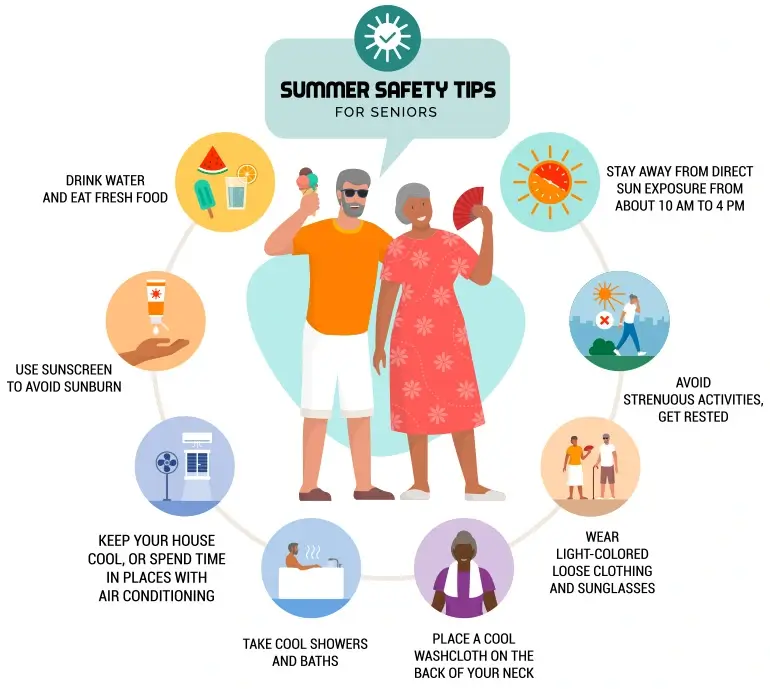Some Common Health Risks Associated with Hot Summer Weather

Hot summer weather can pose various health risks, especially when temperatures are unusually high or during prolonged heatwaves. Some common health risks associated with hot summer weather include:
Heat Exhaustion: Heat exhaustion occurs when the body becomes overheated due to prolonged exposure to high temperatures and inadequate fluid intake. Symptoms may include heavy sweating, weakness, dizziness, nausea, headache, and fainting. If not treated promptly, heat exhaustion can progress to heatstroke, a life-threatening condition.
Heatstroke: Heatstroke is a severe heat-related illness characterized by a body temperature above 104°F (40°C) and central nervous system dysfunction. Heatstroke is a medical emergency and can lead to organ damage, coma, and death if not treated promptly. Symptoms may include confusion, rapid heartbeat, hot and dry skin (in classic heatstroke) or flushed, moist skin (in exertional heatstroke), and loss of consciousness.
Dehydration: Hot weather can increase fluid loss through sweating, leading to dehydration if adequate fluids are not consumed to replace lost fluids. Dehydration can cause symptoms such as dry mouth, dark urine, fatigue, headache, and dizziness. Severe dehydration can lead to electrolyte imbalances, kidney problems, and heat-related illnesses.
Sunburn: Exposure to the sun's ultraviolet (UV) radiation during hot summer weather can cause sunburn, a painful skin condition characterized by redness, swelling, and blistering of the skin. Sunburn increases the risk of skin cancer and premature aging of the skin. It's important to use sunscreen, wear protective clothing, and seek shade to prevent sunburn.
Respiratory Problems: Hot and humid weather can exacerbate respiratory problems, such as asthma and allergies, due to increased levels of air pollution, pollen, and mold spores. High temperatures and poor air quality can trigger asthma attacks, difficulty breathing, coughing, and wheezing in susceptible individuals.
Heat-Related Illnesses in Vulnerable Populations: Certain populations, such as the elderly, young children, pregnant women, individuals with chronic medical conditions, and outdoor workers, are at higher risk of heat-related illnesses during hot summer weather. Vulnerable populations may have difficulty regulating body temperature, adapting to heat, or accessing cool environments, increasing their susceptibility to heat-related health problems.
Heat-Related Injuries: Hot weather can increase the risk of heat-related injuries, such as heat cramps, heat exhaustion, and heatstroke, during outdoor activities and sports. Physical exertion in hot conditions can lead to excessive fluid and electrolyte loss, muscle cramps, and heat-related illnesses if proper precautions are not taken.
Exacerbation of Chronic Health Conditions: Hot summer weather can worsen symptoms of chronic health conditions, such as heart disease, diabetes, and mental health disorders. High temperatures can increase blood pressure, blood sugar levels, and stress levels, leading to complications and exacerbations of underlying health conditions.
It's essential to take preventive measures to protect against heat-related health risks during hot summer weather, such as staying hydrated, staying cool indoors or seeking shade outdoors, wearing lightweight, breathable clothing, and avoiding strenuous outdoor activities during the hottest parts of the day. Additionally, checking on vulnerable individuals, such as elderly neighbors or individuals with chronic illnesses, and seeking medical attention for severe symptoms of heat-related illness are crucial steps to ensure health and safety during hot summer weather.
Thank you,